Science in Action
Recently published in the American Psychological Association (APA) online, Dr. Eduardo Salas brings science to life.
“My job is to study and solve. In nearly 30 years, I’ve never been bored”, says Salas.
Like every operational machine, a company functions due to the collaboration of incorporated mechanics. In order for said company to run smoothly and with success, all facets within need to operate in synchronicity: Employers, intercommunication, and employees alike. Enter center-stage, I/O Psychology. This dynamic field is focused on the scientific study of human behavior in the workplace to assess the individual, group and response mechanisms within to churn out highly successful and streamlined work performance. Think of I/O Psychology as the oil essential to the continued life of operational machinery.
Organizational Psychologist, Dr. Eduardo Salas understands the need for I/O Psychology and immerses himself into simulated and real-life application of this field each day. When assessing how his field benefits an organization and its functions, Salas states,
“We change the minds of engineers, pilots, sailors, instructors and team leaders… about how to train, diagnose competencies, develop teams, be leaders and build simulators for learning. That is our legacy.”
After earning his degree in I/O Psychology from the University of Nebraska, Salas migrated to Old Dominion University where he believes his curiosity and interest of this field took fire and lit his way to immersing himself into human behavior research. Through his vast experience in I/O Psych through Old Dominion, Salas now works today at the Institute for Simulation and Training at the University of Central Florida.
Salas and his team’s simulated and real-life application research puts in perspective the many facets of decision-making scenarios in order to diagnose the unknown how’s and why’s. This research uncovers the reasoning behind situational mistakes – especially those having occurred in high-stakes circumstances – through immersion into the environment in question and observing all possible response routes. Salas’ trial-and-error style of research enables him and his team to fully grasp what measures need to be taken to improve said environment.
The many facets of Dr. Salas’ research:
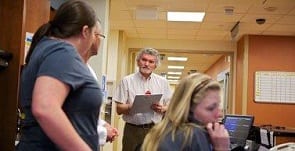 Observing Interaction – Dr. Salas observes the emergency registration desk at Florida Hospital in Orlando to learn more about the ways nurses interact as a team, especially when they are under pressure.
Observing Interaction – Dr. Salas observes the emergency registration desk at Florida Hospital in Orlando to learn more about the ways nurses interact as a team, especially when they are under pressure.
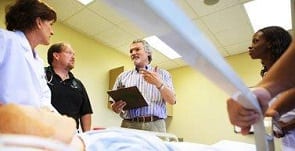 Simulated Environments – Dr. Salas works with health care providers in simulated patient environments to identify science-based solutions that will help them perform better and improve patient outcomes.
Simulated Environments – Dr. Salas works with health care providers in simulated patient environments to identify science-based solutions that will help them perform better and improve patient outcomes.
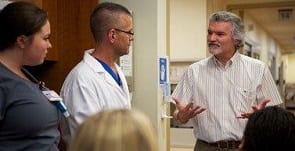 Team Dynamics – Dr. Salas talks with Florida Hospital’s emergency room nurses to help him better understand their team dynamic. He asks questions that will help him test his theories about team performance.
Team Dynamics – Dr. Salas talks with Florida Hospital’s emergency room nurses to help him better understand their team dynamic. He asks questions that will help him test his theories about team performance.
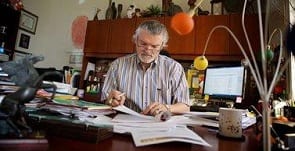 Deciphering Challenges – Dr. Salas reviews the data he has gathered to help him understand the challenges facing teams that work in high-stakes environments and help them improve their team dynamics and communications.
Deciphering Challenges – Dr. Salas reviews the data he has gathered to help him understand the challenges facing teams that work in high-stakes environments and help them improve their team dynamics and communications.
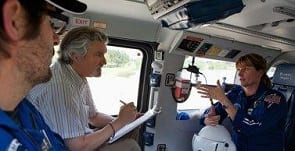 High-Stakes Industries – Dr. Salas partners with people working in high-stakes industries, like helicopter pilots, to understand the types of scenarios they face and how teamwork can help them during stressful situations.
High-Stakes Industries – Dr. Salas partners with people working in high-stakes industries, like helicopter pilots, to understand the types of scenarios they face and how teamwork can help them during stressful situations.
 Training Teams – Dr. Salas trains people to help them work better as teams. After observing nursing students perform tasks in a simulated patient environment, he shares ideas to help them communicate better..
Training Teams – Dr. Salas trains people to help them work better as teams. After observing nursing students perform tasks in a simulated patient environment, he shares ideas to help them communicate better..
Delving further into the realm of high-stakes situations, what Salas believes is most noteworthy of I/O Psychology turns out to be its future reach – outer space. Rapid technological advances have enabled researchers to transition their focus from Earth-bound to Space exploration. Specifically, Mars. NASA envisions exploration of Mars around the year 2030 with five to seven astronauts pioneering this venture. And just as expected, this brave new conquest for man delivers with it a handful of possible space-sized complications. NASA currently has concern regarding this 24- to 30- month mission’s physiological impacts upon participating astronauts, as well as performance in such a foreign environment.
Salas’ extensive research in I/O Psychology enables him to reach far into NASA’s pending concerns through team dynamic and isolated environmental analysis. In studying the facets of this posing mission, Salas will be able to advise those involved on the most productive and safe measures available for use.
Through Salas’ continued I/O Psychology research, organizations can rest assured their inner-workings are well-oiled and running smoothly.
To read more about Dr. Salas’ research click here for the APA website.
To watch Dr. Salas’ video “Solving Problems Through Team Training”

